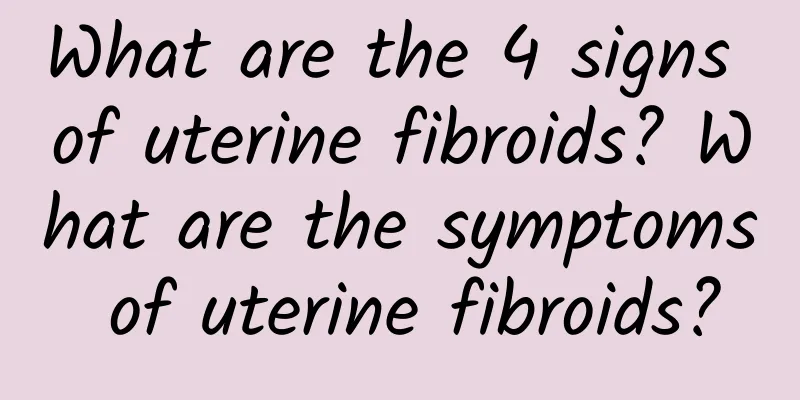What are the 4 signs of uterine fibroids? What are the symptoms of uterine fibroids?

|
Uterine fibroids are one of the common gynecological diseases, and their incidence is quite high among women. Many women often experience some discomfort symptoms after suffering from uterine fibroids, so we should pay special attention to the occurrence of these symptoms in our daily lives and seek medical treatment in time. So what are the 4 signs of uterine fibroids? Let's introduce them one by one in detail below. 1. Abnormal menstrual flow: Uterine fibroids can cause women to have increased menstrual flow or even irregular menstruation. Gynecologists call this condition polycystic ovary syndrome. These menstrual problems often make women feel uncomfortable and may even cause blood clots and prolonged menstruation. If you find that your menstrual period is abnormal, you should see a doctor for examination in time. 2. Pelvic pain: Uterine fibroids can cause pelvic pain, especially during menstruation. This pain can last for several days, and the pain is often unbearable for women. Sometimes the pain radiates to the waist and thighs, and is even accompanied by a feeling of abdominal distension. If this symptom occurs, you must seek medical attention in time to avoid delaying the treatment of the disease. 3. Frequent urination and urgency: The location and size of uterine fibroids will compress the bladder, leading to frequent urination and urgency. Women will feel the need to urinate frequently, with a small amount of urine, and sometimes feel like they can't urinate completely. This usually occurs when the uterine fibroids are large, but not all patients will have this symptom, so if this happens, you should also seek medical attention in a timely manner. 4. Compression and difficulty in defecation: Also because of the compression of uterine fibroids on the bladder, patients may also experience symptoms of difficulty in defecation. Defecation will become difficult and may be accompanied by constipation. This is because the abdominal muscles are too tense, making defecation difficult. If this situation occurs for a long time, you should seek medical attention for diagnosis in time. The symptoms of uterine fibroids are as mentioned above. If women have the above 4 signs in their daily life, they should go to the hospital for examination in time. Although uterine fibroids are very common, they will not affect fertility in most cases. However, if not treated in time, uterine fibroids may become larger and larger, and may even lead to the occurrence of malignant tumors. Therefore, for patients who have been diagnosed with uterine fibroids, it is very important to carry out scientific treatment and careful care as soon as possible. The four signs of uterine fibroids are abnormal menstruation, pelvic pain, frequent urination and difficulty in defecation. Knowing these signs will help women to find their problems in time and seek medical treatment to avoid further development of the disease. In daily life, maintaining good living habits and regular check-ups can effectively prevent the occurrence and recurrence of uterine fibroids. |
Recommend
What are the common methods for diagnosing pelvic inflammatory disease?
Pelvic inflammatory disease is a common disease a...
There is no sin in eating cottage cheese! Can raise muscular men
If you want to be a "muscular man", eat...
Can cervical erosion cause infertility?
Cervical erosion is a gynecological disease. This...
What are the symptoms of acute ectopic pregnancy?
Any pregnancy that occurs outside the uterine cav...
How harmful is the first abortion for a girl? Things to note when a girl has her first abortion
Some couples do not take effective protective mea...
Daily care methods for uterine effusion
Uterine effusion should be treated actively and t...
What causes ovarian cysts and how to treat them
Ovarian cysts may be caused by functional cysts, ...
How to treat chlamydia
Chlamydia infection is a common sexually transmit...
Beauty study: Chubby people live longer than thin people
Modern people prefer a thin and skinny body. Thin...
What can you eat to cure menopausal night sweats quickly? You will know after reading this
For women who experience menopausal night sweats,...
Is pelvic peritonitis serious?
Pelvic peritonitis is a disease with a very high ...
Life-saving foods to prevent colorectal cancer! Cabbage and garlic can fight cancer
Variety show king Zhu Geliang was recently admitt...
What are the factors that cause adnexitis?
Adnexitis mainly refers to a series of inflammato...
Women near menopause can try expectant treatment for uterine fibroids
Usually women need to find the right treatment fo...
How to treat premature ovarian failure
Premature ovarian failure is a disease caused by ...









